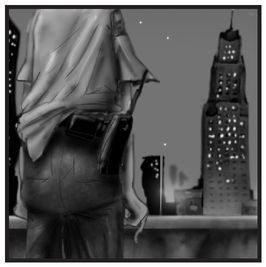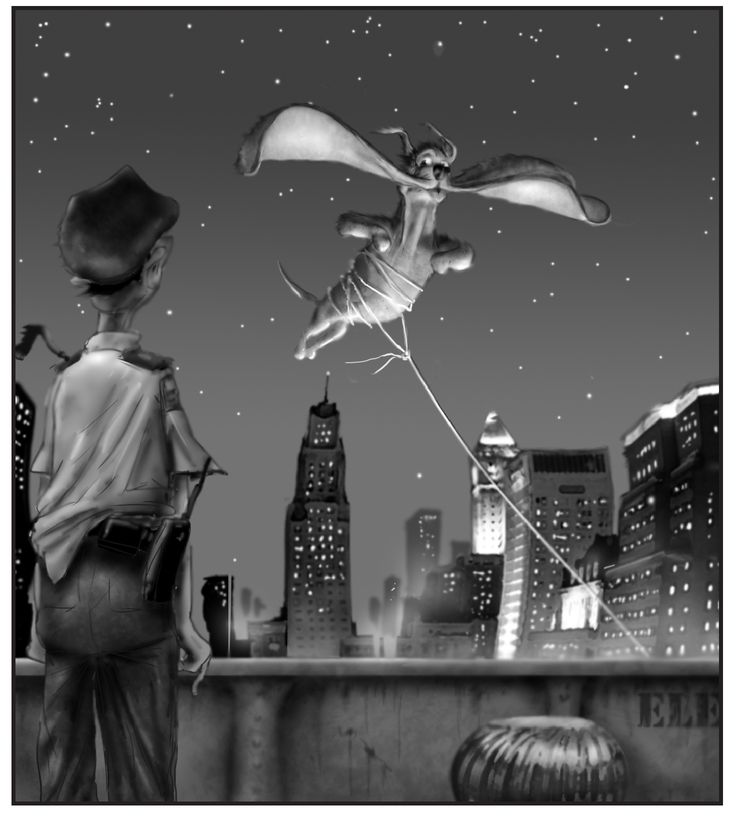Flawed Dogs (17 page)
Authors: Berkeley Breathed

FLYER
If Mr. Flemmie Croup, the sole administrator, caretaker and poop scooper of the National Dog Depository for the past forty-six years, had been just five minutes earlier in waking up the next morning . . . if he had been just one mile per hour faster in walking to work . . . if he had been only slightly less patient with feeding the squirrels in the freight yard that morning and had chucked the whole stale baguette at them instead of breaking it up into pieces . . . then he might have actually stumbled into the dog escapees dashing out the front door ten minutes before dawn and he would have stopped the grand enterprise cold right there, leaving this book without an ending.
But he was not.
And he did not.
And it has one.
Mr. Croup arrived as always at three minutes
after
dawn and found the front door wide open and the dreadful building wholly absent of its seven permanent occupants. After wandering around tidying up, he then did what he’d never done in those forty-six years: He took the day off. And he went home for a bubble bath, in which he pondered in bubbly relish the thought that whatever sort of day his former depositees were about to experience . . . whatever trouble, mischief or harrowing mayhem they were to wander into . . . it would, without doubt, be the best day of their miserable lonely lives.
after
dawn and found the front door wide open and the dreadful building wholly absent of its seven permanent occupants. After wandering around tidying up, he then did what he’d never done in those forty-six years: He took the day off. And he went home for a bubble bath, in which he pondered in bubbly relish the thought that whatever sort of day his former depositees were about to experience . . . whatever trouble, mischief or harrowing mayhem they were to wander into . . . it would, without doubt, be the best day of their miserable lonely lives.
He was right.

The dawn broke in a sky clearing of the previous night’s storm clouds. The Manhattan Flyer sped southward toward New York City with nine freeloading passengers atop its streamlined engine. They’d dropped from a trestle stretching over the rails back in Vermont after the engineer had slowed on spying what appeared to be a cowboy wearing a tutu sitting on the tracks reading a newspaper. On inspection, the trainman found it to be an old smashed store mannequin propped up with sticks, dressed in folds of pink wall insulation and a discarded straw hat. He continued southward, but now with a commando squad of unwanted mutts sitting directly above his head.
Soon, the steel pinnacles of New York City appeared on the brightening horizon. Most of the dogs were rehearsing the elaborate plan that Sam had explained to them the night before. But they also stole excited glances at a world speeding by them that they’d simply never really known existed.
Freshly woken, Sam lay on his back next to the roaring diesel exhaust, absorbing the warmth, looking at the clearing sky, thinking about what he had to do.
Peaches stared down at him.
“Sammy. I heard ya sneezin’ durin’ your nappy. But it weren’t sneezes you was blurtin’ out but a name: Cassius. Cassius. Cassius.”
Sam shrugged.
“This Cassius chap . . . ’Ee’s up ahead somewhere, ain’t he? ’Ee’s what this ’ole thing is about, I’m thinkin’.”
Sam didn’t say anything.
“It won’t be a kiss you’ll be givin’ yer Cassius, will it?”
Silence.
“Oh, lad, it’s a bad thing ya got in mind. I wouldn’t be sayin’ this if we wasn’t such lifelong mates. I think yer using those poor blokes.” Peaches looked at the other dogs farther back on the engine, pointing out the sights speeding by.
“They had nothing. Now they have a purpose,” said Sam, stretching.
“Aye. Purpose ’n’ pooches,” sighed the odd dog. “Not much to that. They’re not designed to catch a mouse. They’re not meant to bring down a gallopin’ wildebleedin’ beast. Don’t round up cows or sheep or pick up a log with their nose.” He spat. “There is only one thing we silly slobbering furbags are put on this earth to do.”
Peaches moved in close to Sam and pointed to the lights of Manhattan ahead. “This ain’t it, lad.”
Sam looked at him and said nothing. He turned and moved to the front edge of the roaring engine and raised himself on his rear legs—both bone and steel, his body upright like a sail, leaning forward, ears flowing backward into the morning’s rising sun. The dachshund closed his eyes, his front paws pushed wide with the rushing wind, as if to embrace the sparkling city that sped closer . . . and a destiny darker than the other dogs suspected.
“Storm’s over,” Sam said.
“Not yet,” said the little mutt quietly.

TWENTY-SEVEN

QUACK
Midnight.
New York City.
Two days before the big dog show.
Eldon P. Liddle, night watchman for Madison Square Garden, was dozing on the arena’s roof in a lawn chair, as he always did on balmy summer New York nights. But it was quite breezy, and the sound of the wind through the decorative palm trees lining the roof’s round edge woke Eldon just in time for him to see Jeeves come into view.
Eldon noted that Jeeves wasn’t a particularly beautiful dog. Not like the ones that came every year and were due the next morning to prance around the arena far below him. This dog’s jowls, for instance, were extraordinarily enormous and inflated like a flapping beach towel in the wind, floating the animal twelve feet from Eldon’s stupefied face and 200 feet above the ground. A string wrapped around Jeeves’s chest disappeared down toward the street, presumably, thought Eldon, to a gang of dog-flying terrorists in the parking lot.
Startled into petrified inaction, Eldon watched Jeeves drift on the breeze like a slobbering kite, scanning the items on the roof with the help of sharp eyes and a full moon. Jeeves noted three things as he floated: A huge water tank on stilts, several palm trees in large wooden dirt planters, and a very large roof skylight over the center of the arena below.
Jeeves motioned to be pulled back down. As the hound dog descended, Jeeves happened to look over at security guard Eldon P. Liddle and—giddy with the excitement of a newly purposeful life—did something that would cause the poor man to quit at the end of his shift:
He flapped his wings and quacked.


TWENTY-EIGHT

BORROWING
Noon.
One day before the big show.
Mrs. Corinthian Nutbush—last seen three years before, strapped to a Vermont ambulance gurney without most of her clothes—walked out the front doors having freshly registered her new long-haired dachshund, Mr. Toodles, for the Westminster competition. As usual, Mrs. Nutbush was wrapped from head to foot in the fur of many of the world’s rarest animals. On this day, it was leopard, chinchilla, baby seal, and the rare Peruvian long-haired blue vole, the latter species having only a dozen known individuals left on the planet before Mrs. Nutbush’s hat was made from ten of them.
Her Mr. Toodles led the way on a jeweled leash.
After tucking her priceless Westminster credentials inside her purse, Mrs. Nutbush moved into Central Park and paused to sit on a bench in front of the east fountain, as the stress of preparing for the world’s most important dog show was wearing on a giant gopher-like woman her age.
She dozed off while Mr. Toodles licked up the pigeon droppings, whose taste he found similar to Junior Mints.
Mr. Toodles looked up from his brunch to see what at first he thought was a spotted mouse with the end of a long string in its mouth emerge from the hedge, run up Mrs. Nutbush’s seal boot and disappear below her coat. Mr. Toodles sat down and continued tracking the creature by the small movements he could see it make as it traversed the towering peaks and valleys amidst the generous acreage below Mrs. Nutbush’s clothes. The dachshund watched, fascinated, as the rodent scampered through the coat, the handbag, both her gloves, the loops on the back of the boots, and then finally up to her scarf around the mighty Nutbush neck.
It wasn’t until Mr. Toodles saw the little creature actually drop the string temporarily, creep up the snoring woman’s face and poke its head deep into the vastness of her right nostril that he finally realized that the creature wasn’t a mouse at all but a three-ounce dog. He knew this because when the tiny mutt pulled his head out from the Nutbush honker, he turned around, looked down at the staring dachshund and said,
“If you yodel, there’s an echo!”
“If you yodel, there’s an echo!”
Other books
Missing Man by Barry Meier
The Perfectionists by Sara Shepard
Impossible by Komal Lewis
Howl of the Wolf by N.J. Walters
And the Greatest of These Is Love: A Contemporary Christian Romance Novel by Staci Stallings
The Celibate Mouse by Hockley, Diana
Sex, Bombs and Burgers by Peter Nowak
Burning for Revenge by John Marsden
Russian Spring by Norman Spinrad
El hotel de los líos by Daphne Uviller